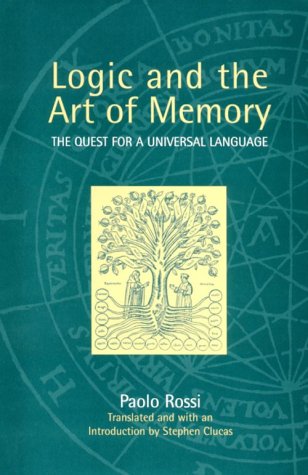
Sinopsis
The mnemonic arts and the idea of a universal language that would capture the essence of all things were originally associated with cryptology, mysticism, and other practices. This work argues that this view is belied by an examination of the history of the idea of a universal language.
"Sinopsis" puede pertenecer a otra edición de este libro.
Acerca del autor
Paolo Rossi is a professor emeritus in the Department of History and Philosophy at the University of Florence. His many books include Francis Bacon: From Magic to Science and The Dark Abyss of Time. Stephen Clucas is a lecturer in the humanities at Birkbeck College.
De la contraportada
The mnemonic arts and the idea of a universal language that would capture the essence of all things were originally associated with cryptology, mysticism, and other occult practices. And it is commonly held that these enigmatic efforts were abandoned with the development of formal logic in the seventeenth century and the beginning of the modern era. In his distinguished book, Logic and the Art of Memory Italian philosopher and historian Paolo Rossi argues that this view is belied by an examination of the history of the idea of a universal language.
Based on comprehensive analyses of original texts, Rossi traces the development of this idea from late medieval thinkers such as Ramon Lull through Bruno, Bacon, Descartes, and finally Leibniz in the seventeenth century. The search for a symbolic mode of communication that would be intelligible to everyone was not a mere vestige of magical thinking and occult sciences, but a fundamental component of Renaissance and Enlightenment thought. Seen from this perspective, modern science and combinatorial logic represent not a break from the past but rather its full maturity. Available for the first time in English, this book (originally titled Clavis Universalis) remains one of the most important contributions to the history of ideas ever written. In addition to his eagerly anticipated translation, Steven Clucas offers a substantial introduction that places this book in the context of other recent works on this fascinating subject. A rich history and valuable sourcebook, Logic and the Art of Memory documents an essential chapter in the development of human reason.De la solapa interior
Based on comprehensive analyses of original texts, Rossi traces the development of this idea from late medieval thinkers such as Ramon Lull through Bruno, Bacon, Descartes, and finally Leibniz in the seventeenth century. The search for a symbolic mode of communication that would be intelligible to everyone was not a mere vestige of magical thinking and occult sciences, but a fundamental component of Renaissance and Enlightenment thought. Seen from this perspective, modern science and combinatorial logic represent not a break from the past but rather its full maturity.
Available for the first time in English, this book (originally titled Clavis Universalis) remains one of the most important contributions to the history of ideas ever written. In addition to his eagerly anticipated translation, Steven Clucas offers a substantial introduction that places this book in the context of other recent works on this fascinating subject. A rich history and valuable sourcebook, Logic and the Art of Memory documents an essential chapter in the development of human reason.
"Sobre este título" puede pertenecer a otra edición de este libro.
Otras ediciones populares con el mismo título
Resultados de la búsqueda para Logic and the Art of Memory: The Quest for a Universal...
Logic and the Art of Memory: The Quest for a Universal Language
Librería: Toscana Books, AUSTIN, TX, Estados Unidos de America
Hardcover. Condición: new. Excellent Condition.Excels in customer satisfaction, prompt replies, and quality checks. Nº de ref. del artículo: Scanned0226728269
Comprar nuevo
Cantidad disponible: 1 disponibles
Logic and the Art of Memory: The Quest for a Universal Language
Librería: Frank Martignon Bookseller, Atlanta, GA, GA, Estados Unidos de America
Hardcover. Condición: New. Estado de la sobrecubierta: Fine. 1st Edition. One of the most important contributions to the history of ideas ever written. Translated with an Introduction by Stephen Clucas. Notes w/ Bibliographical References. Index. xxviii, 333 pp. Fine Hardcover w/ Fine dj. Nº de ref. del artículo: 001326
Comprar nuevo
Cantidad disponible: 1 disponibles

